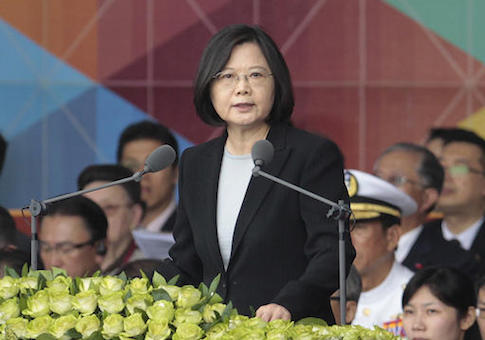Taiwan is seeking admission to Interpol's annual assembly, and has the support of a pair of U.S. lawmakers who argue that Taipei's exclusion from the international police organization compromises global security.
Taiwan's plea to participate in the Interpol assembly next month as an observer, after decades of exclusion from the world's largest international police organization, comes at a point of increased security concerns over terrorism and particularly the rise of ISIS in Southeast Asia.
Taiwan, formally known as the Republic of China, was forced to withdraw from the International Criminal Police Organization, or Interpol, when China joined in 1984. Taiwan has been excluded from Interpol and other international organizations over its refusal to adopt Beijing's interpretation of the "one China" principle.
Reps. Ed Royce (R., Calif.) and Matt Salmon (R., Ariz.) have voiced support for Taiwan's participation in the assembly, arguing that Taipei's continued absence from Interpol is undermining the security of the world.
"It's time Taiwan be allowed to obtain Interpol observer status. The continued exclusion of Taiwan—a strong friend and critical partner of the United States—from this important organization is troubling," Royce, who chairs the House Committee on Foreign Affairs, said in a statement last week. "Global security is needlessly put at risk due to Taiwan's inability to quickly share and receive the latest information about international crime. Everyone's security would be improved by Taiwan's participation in Interpol."
Salmon, who heads the Foreign Affairs Subcommittee on Asia and the Pacific, told the Washington Free Beacon in an interview Friday that Taiwan's exclusion from Interpol is "absolutely" harming global security.
"Given the fact that all nations that are concerned about either drug trafficking or terrorism or human trafficking or the war on terror, it's all hands on deck when it comes to overcoming these issues, these security risks to our countries," Salmon said. "It doesn't make sense at all that a country as developed and capable as Taiwan would have to go to second parties to get information and not on a time-sensitive basis."
Taiwan's National Security Bureau said this month that Taiwan is a potential target for terrorist groups. The probability of Taiwan being targeted by foreign terror organizations, the bureau said, increased with the release of an ISIS video last year featuring the Republic of China flag in a list of 60 countries contributing to the U.S.-led mission against the group.
The threat has also risen as a result of ISIS's push to expand its reach in Southeast Asia.
ISIS has looked to recruit fighters and spur attacks in Southeast Asia as the group has suffered territorial losses in its so-called caliphate, which spans portions of Iraq and Syria. ISIS published a local language paper to recruit jihadists in the region over the summer and released a video declaring the Philippines its territory and asking supporters to travel there. Jihadist groups in the region have also pledged allegiance to ISIS, including Abu Sayyaf in the southern Philippines, which U.S. advisers are helping local forces fight.
Taipei is set to host the 2017 Summer Universiade college games next August, an event that is expected to draw 12,000 participants from 150 countries, and which could be a potential target for terror attacks, according to the National Security Bureau.
Interpol facilitates international police cooperation between 190 member countries to fight crime and thwart terror threats. The organization's general assembly this year will take place in Bali, Indonesia, between Nov. 7 and 10.
If Taiwan is not allowed access to the assembly as an observer, it will be another sign of China's increasing pressure on Taipei's new government to conform to the "one China" principle.
Relations between Taiwan and China have grown frostier in the wake of the election of Taipei's new leader, Tsai Ing-wen, who refused to affirm the 1992 Consensus in which Taipei and Beijing agreed that they were part of "one China" during her inaugural address in May. Tsai is a member of the Democratic Progressive Party, which favors ultimate and formal separation from China.
The State Department has repeatedly said that it supports Taiwan's participation in international organizations, such as Interpol, that don’t require statehood for membership. According to a law that President Obama signed earlier this year, Secretary of State John Kerry is required to develop a strategy to achieve "observer" status for Taiwan in Interpol.
But the Obama administration's statements supporting Taiwan's inclusion in these organizations have been no match for China's efforts to block Taipei's participation.
Taiwan also sought to participate as a guest in a United Nations forum on aviation security that took place one month ago, but was rejected as a result of its new leadership's failure to embrace the "one China" principle. The United States acknowledges Beijing's position that Taiwan is part of China.
"I do believe that the administration could be doing a lot more than it's doing. My gauge for that is just that it hasn't happened yet," Salmon said of Taiwan's status at the upcoming Interpol meeting. "I think our influence is pretty great when we decide to use it, and I think that the if the United States decided that it was a top priority, I believe it would happen."
UPDATE 9:30 A.M.: An earlier version of this post incorrectly stated that the United States recognizes Beijing's position that Taiwan is a part of China. The United States acknowledges that this is China's position.
